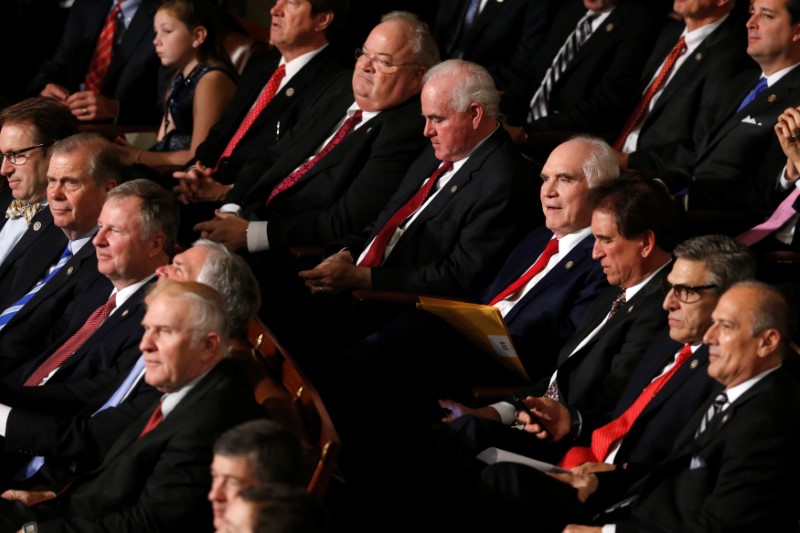
By Jeff Mason and Richard Cowan
WASHINGTON (Reuters) – President Donald Trump said on Tuesday he was ready to accept an onslaught of criticism if lawmakers tackle broad immigration reforms after an initial deal to help the young illegal immigrants known as Dreamers and build a wall on the U.S. border with Mexico.
Trump told lawmakers at the White House he would back a two-phased approach to overhauling U.S. immigration laws with the first step focused on protecting immigrants who were brought here as children from deportation along with funding for a wall and other restrictions that Democrats have opposed.
Once that is done, Trump said, he favors moving quickly to address even more contentious issues, including a possible pathway to citizenship for 11 million illegal immigrants that is opposed by many Republicans and many of his supporters.
“If you want to take it that further step, I’ll take the heat, I don’t care,” Trump told lawmakers about a broad immigration bill. “You are not that far away from comprehensive immigration reform. And if you wanted to go that final step, I think you should do it.”
Trump campaigned for the White House in 2016 with a hard-line approach on illegal immigration, and many of his supporters consider potential citizenship for undocumented immigrants to be an unacceptable grant of amnesty.
Trump said on Tuesday he would sign a bill that gives legal status to the hundreds of thousands of undocumented immigrants brought to the country as children, known as Dreamers, as long as the bill had the border security protections he has sought, including funding for a wall.
“Now, that doesn’t mean 2,000 miles of wall because you just don’t need that … because of mountains and rivers and lots of other things,” Trump said. “But we need a certain portion of that border to have the wall. If we don’t have it, you can never have security.”
Trump and his fellow Republicans, who control the U.S. Congress, have been unable to reach agreement with Democrats on a deal to resolve the status of an estimated 700,000 young immigrants whose protection from potential deportation under the Deferred Action for Childhood Arrivals, or DACA, program ends in early March.
“A VERY PRODUCTIVE MEETING”
Under pressure from immigrant groups ahead of midterm congressional elections in November, Democrats are reluctant to give ground to Trump on the issue of the wall, his central promise from the 2016 presidential campaign.
But after the meeting, lawmakers from both parties said they would meet as early as Wednesday to continue negotiations on a deal covering DACA and border security, as well as a visa lottery program and “chain migration,” which could address the status of relatives of Dreamers who are still in the United States illegally.
“From that standpoint it was a very productive meeting,” said Senator David Perdue, a Republican. “We have a scope now.”
White House spokeswoman Sarah Sanders told reporters the broader bill with a path to citizenship was not a focus for now.
“We’re certainly open to talking about a number of other issues when it comes to immigration, but right now this administration is focused on those four things and that negotiation, and not a lot else at this front,” she said.
Republican Senator Lindsey Graham, who also was at the meeting, said negotiators in Congress still faced difficulties but it was important that Trump had shown he had “no animosity toward the Dream Act kids” and the “wall is not going to be 2,220 miles wide.”
PARTY DIFFERENCES ON BORDER SECURITY
The U.S. Congress has been trying and failing to pass a comprehensive immigration bill for more than a decade, most recently in 2013 when the Senate passed a bill that later died in the House of Representatives.
The latest immigration negotiations are part of a broader series of talks over issues ranging from funding the federal government through next September to renewing a children’s health insurance program and giving U.S. territories and states additional aid for rebuilding after last year’s hurricanes and wildfires.
Top congressional leaders did not attend the hour-long meeting. The guest list included lawmakers from both parties involved in the immigration debate, such as Graham and Democratic Senator Dick Durbin.
A majority of those protected under DACA are from Mexico and Central America and have spent most of their lives in the United States, attending school and participating in society.
Trump put their fate in doubt in early September when he announced he was ending the DACA program created by former President Barack Obama, which allowed them to legally live and work in the United States temporarily.
Steny Hoyer, the No. 2 Democrat in the House of Representatives, said a DACA bill could win support for passage even though there are differences between the parties over what constitutes necessary border security.
“Democrats are for security at the border,” Hoyer told Trump during the meeting. “There are obviously differences, however, Mr. President, on how you affect that.”
On Monday, Trump announced that he was ending immigration protections for about 200,000 El Salvadorans who have been living legally in the United States under the Temporary Protection Status program. Haitians and other groups have faced similar actions.
A congressional aide told Reuters that negotiators in Congress also have been talking about legislation that would expand TPS in return for ending a visa lottery program that Republicans want to terminate.
(Reporting by Jeff Mason and Richard Cowan; Additional reporting by Susan Cornwell, Steve Holland, Susan Heavey and Amanda Becker; Writing by John Whitesides and Jeff Mason; Editing by Leslie Adler)












